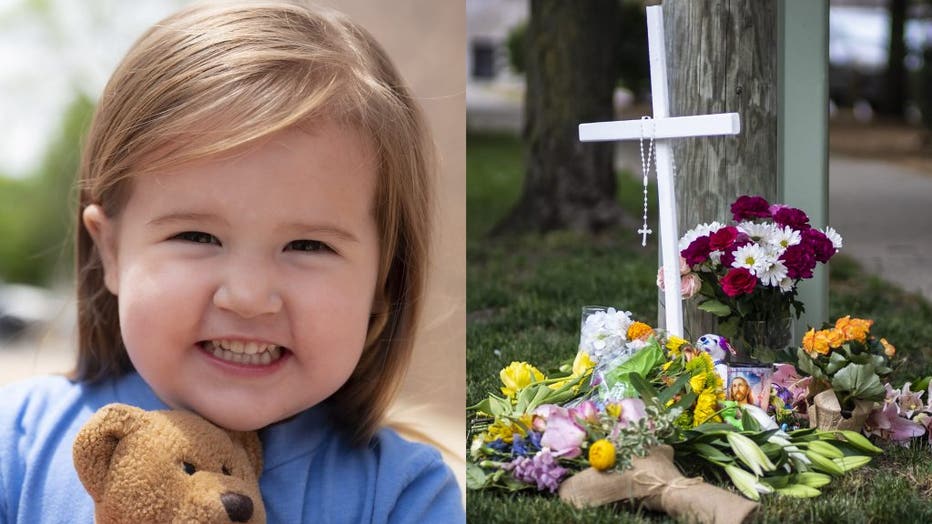As memorial grows for Lily Grace, demands intensify to make streets safer for bicyclists

Child, 3, killed in bike-truck collision in Chicago
A toddler riding on the back of a bicycle was killed in a crash involving a semi-truck Thursday morning in Chicago's Uptown neighborhood.
CHICAGO - A white rosary strung on a white cross, deep red flowers in a vase surrounded by yellow and orange and pink bouquets.
Throughout the day Friday the memorial to Lily Grace grew on the street where the 3-year-old was struck and killed by a semi, on a busy block residents have long complained about.
A stuffed puppy with floppy ears, one purple and the other blue, a plastic pony, a little Mickey Mouse — all nestled around a votive candle.
Late in the afternoon, Grace’s father sent out of photograph of his daughter smiling and clutching a teddy bear, but he had nothing more to add.
"We really have no statement," Tim Shambrook texted the Sun-Times. "There are no words to convey the loss we feel as a family."

A memorial sits at the corner of North Winthrop and West Leland avenues, where 3-year-old Lily Grace was killed in a bicycle crash with a truck in the Uptown neighborhood bike lane, June 10, 2022. | Ashlee Rezin/Sun-Times
Thursday morning, Shambrook and his wife were riding their bicycles on Leland Avenue, Lily sitting in a carrier on her mother’s bike as Shambrook followed.
As they approached Winthrop Avenue, a parked ComEd truck blocked the bike path and Shambrook’s wife had to go around, squeezing her bike between the truck and a semi stopped at the intersection, according to a police report.
The semi started moving and knocked Shambrook’s wife off balance. Lily was thrown off the bike and under the wheels of the semi.
The accident happened about five miles from the couple’s home. Shambrook said he was angry and frustrated that the city doesn’t do more to make its streets safer for bicyclists.
Bicycle advocates say the bike lane on Leland is not cordoned off from other traffic and offers little protection on a street that gets heavy traffic.
"This wasn’t even a real bike lane, it had a dashed line," said Christina Whitehouse, founder of Bike Lane Uprising.
"This is a greenway," she added, referring to that stretch of Leland. "Why do we have semis driving down it? It’s meant to prioritize a residential environment. It’s a priority path for cycling. The city identifies Leland as one of the more calm, safe paths to cycle down. And clearly it’s not."
SUBSCRIBE TO FOX 32 CHICAGO ON YOUTUBE
In the summers of 2020 and 2021, the city converted that stretch of Leland into a "shared street," placing cones to slow traffic and allow more room to pedestrians and cyclists. The cones have not appeared this summer.
"People loved the shared street last year, and people have been asking about it, but why isn’t it happening?" Whitehouse asked.
In the hours after the accident, Ald. James Cappleman (46th) said his office was already talking with CDOT about making Leland Avenue safer for pedestrians and cyclists.
He said his office would now look into what "further measures" could be taken, though he did not mention what they might be.
The Active Transportation Alliance said those measures should include "concrete curb extensions, bump outs and raised crosswalks and intersections" to control and speed and volume of traffic on Leland.
"City officials clearly need to do more," said Amy Rynell, head of the group. "This patchwork approach of addressing one block here and another few blocks over there is not working. City officials need to fundamentally redesign entire corridors."
Whitehouse also favors "separated concrete protected bikeways."
"If you want cyclists to be in a certain area, make it safe," she said. "I can guarantee that (the girl’s) mom is a more experienced cyclist than I am. There’s nothing she did that I wouldn’t do. People have no other options than to bike next to semis, to get forced next to traffic."
Both Whitehouse and Rynell said truck traffic needs to be better managed.
ComEd said it had a permit from the Chicago Department of Transportation to work in the area where the truck was parked.
But Susan Hofer, a spokeswoman for the department, said "no CDOT permit allows a vehicle to park in a bike lane."
The department said it was "conducting a complete review of the circumstances involved in yesterday’s fatality" and declined to release details of the permit issued to ComEd.
ComEd had no comment Friday.
"ComEd was blocking the bike lane and they were also impeding the view of the intersection," Whitehouse said. "They were not supposed to be that close to the stop sign. We know intersections are the most dangerous places for bicyclists."
Rynell said she is frustrated because "these issues have been discussed for years in neighborhoods across Chicago, yet little has been done to fix our most dangerous streets and make designated bike routes truly safe and comfortable for all."

